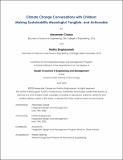Climate Change Conversations with Children: Making Sustainability Meaningful, Tangible, and Actionable
Author(s)
Crease, Alexander; Singhasaneh, Natha
DownloadThesis PDF (30.56Mb)
Advisor
Hu, Antonio
Terms of use
Metadata
Show full item recordAbstract
For many of us, negative emotions surface when confronted with the environmental issues we face as a society. Young people in particular can experience high levels of eco-anxiety due to climate change. Adults do not feel informed enough to facilitate constructive conversations with young people about climate change, and often feel stressed and disempowered from doing so. A myriad of issues, including lack of confidence, friction in the education system, pessimistic messaging, misinformation, and polarization perpetuate a “spiral of silence” around the subject, making it one that adults do not like bringing up with each other, let alone their children. Value-based behavioral change surrounding sustainability at the individual, communal, and societal levels is essential for an environmentally resilient future. It is our responsibility to equip the next generation with the values, mindsets, and habits that prepare them for the environmental challenges they will face in the future. To help break the spiral of silence, we examined how conversations and action around sustainability can be normalized. Specifically, we explored how we might make discussion of sustainability meaningful, tangible, and actionable for children, while providing adults with an approachable, adaptable, and empowering resource for these conversations. Our work reviews academic research on eco-anxiety and the effectiveness of various communication pedagogies with existing solutions and their implications. In addition to our secondary research, we engaged a wide range of stakeholders – including parents, educators, researchers, and children – through interviews and workshops to develop the Sustainability Communication Framework. This framework includes Design Elements critical for engaging children in sustainable thinking and action, as well as Design Principles which guide how ideas can be most effectively communicated. Case studies are provided to demonstrate how effective solutions can be viewed through the lens of the framework. The framework can be applied in a variety of settings to guide experiences that normalize and reinforce values around sustainability. By supporting adults in making sustainability education age-appropriate to children, we hope to create a long-term impact by changing the way that children view and interact with the world, nurturing them into critical thinkers and active changemakers.
Date issued
2023-06Department
System Design and Management Program.Publisher
Massachusetts Institute of Technology